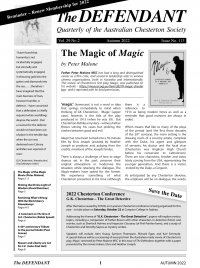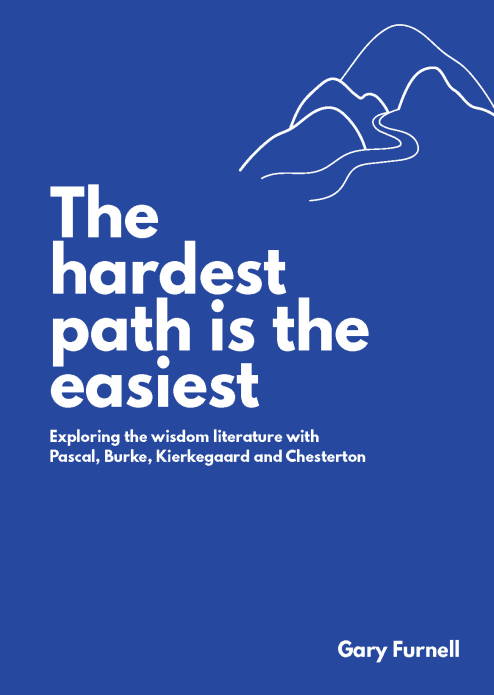David Daintree, Director of the Christopher Dawson Centre for Cultural Studies in Hobart and formerly President of Campion College Australia, finds much to praise in Gary Furnell’s recent book, The Hardest Path is the Easiest: exploring the Wisdom Literature with Pascal, Burke, Kierkegaard and Chesterton (Connor Court, Australia 2021, $29.95). Available from Connor Court Publishing.
The Hardest Path is the Easiest: exploring the Wisdom Literature with Pascal, Burke, Kierkegaard and Chesterton by Gary Furnell
Writing a book review is sometimes a chore that one performs for a friend’s sake. At other times when the quality is high and the content attractive it’s a pleasure.
Gary Furnell’s little book is in a class apart: it’s a charming and skilful anthology of excellent writing from four quite diverse sources, all ably tied together by the author’s lucid and wise commentary.
His choice of sources is inventive and exciting: I had never seen such a selection before and found the whole thing a delight to read. No chore at all, just a pleasure.
A fitting alternative title of the book could have been drawn from the opening words of Psalm 14: The fool hath said in his heart, There is no God. Furnell would have been far too courteous to call it that, though one suspects that his sources (with the possible exception of the holy and kindly Kierkegaard) would have no such qualms. And the word Folly occurs frequently in the text. For the whole book is firmly founded on the fact (let’s not mince words) that almighty God created the universe, and that all its evils are consequent upon the wilful wickedness of mankind.
To say that this book would not appeal to most people living in our modern post-Christian secular world is an understatement of the most extreme kind. The very idea of man’s dependence upon and subservience to God is outrageous, even obscene, but God is not mocked and the day will come when all will discover the greatness of the truth.
But in the meantime if any modern default-position atheists should pick up this book (and God grant that some such people will) they will find amazing things to extend their vision, expose the folly that we’re all prone to, and even draw them to the threshold of conversion.
A short review allows little space for quotations, but a few things deserve mention.
There’s Burke on politicians who ‘choose to make themselves bidders at an auction of popularity’. Sound familiar? And on society as a contract: ‘a partnership not only between those who are living, but between those who are living, those who are dead, and those who are to be born.’
Original Sin is the most unpopular Christian doctrine, despite being (as Chesterton observed) the only one that is absolutely self-evident. Here is Furnell himself on its fatal effects: ‘All people, rich and poor, are equally capable of grasping, manipulative actions … the shirker, the labouring man and the well-paid executive are all vulnerable to the temptations of self-seeking.’
There is no Christian smugness here: all people are weak, all are fallen. There is no hope for a world that blames everything on ‘systems’, or gender, or race, and denies the democracy of evil.
Chesterton understood. ‘Man is an exception, what- ever else he is. If he is not the image of God, then he is a disease of the dust. If it is not true that a divine being fell, then we can only say that one of the animals went entirely off its head.’
And Pascal has something to say to those who see no real difference between mankind and its pets: ‘It is dangerous to make man see too clearly his equality with the beasts without showing him his greatness. It is also dangerous to make him see his greatness too clearly, apart from his vileness. It is still more dangerous to leave him in ignorance of both.’
Kierkegaard wittily comments on the paradox of human folly: ‘The biggest danger, that of losing oneself, can pass off in the world as if it were nothing; every other loss, an arm, a leg, five dollars, a wife, etc. is bound to be noticed.’
These quotations have been chosen because they appealed to this reviewer’s fancy, but the book is otherwise profusely rich in such good things. I haven’t chosen anything from the Wisdom Literature because there is so much of it, and it’s so aptly named.
I enjoyed this book immensely, from cover to cover, and recommend it highly. It will give reassurance and confidence to the believer amidst these difficult times and will at least partially open the mind of the sceptic, if you can persuade him to exercise his eyes!

